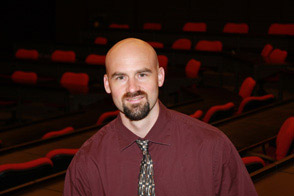
Alan Beaman (Photo: Jennifer Linzer)
Despite the lack of any direct evidence of his guilt, Alan Beaman, a college student, was convicted of the 1993 murder of his former girlfriend Jennifer Lockmiller, which happened in Normal, Illinois. In reality, at the time of murder Beaman was at his family’s home in Rockford, Illinois, 140 miles from the crime scene. Assistant McLean County State’s Attorney James Souk told the jury that there were only three potential suspects in the case, and that the other two had verified alibis. Beaman was sentenced to 50 years and narrowly lost his direct appeal by a 2-1 vote; Fourth District Appellate Court Justice Robert W. Cook would have reversed Beaman’s conviction outright based on insufficient evidence.
During the course of lengthy post-conviction proceedings, Beaman’s Center on Wrongful Convictions attorneys, Jeffrey Urdangen and Karen Daniel, developed evidence showing that the prosecution had failed to disclose evidence regarding another suspect in the case and had misled the jury with regard to critical timeline facts. Although the circuit and appellate courts continued to uphold the conviction, the Illniois Supreme Court unanimously reversed Beaman’s conviction on May 22, 2008, finding that the trial prosecutor, Souk, had violated Beaman’s constitutional rights. The high court characterized the State’s case against Beaman as “tenuous” and found it probable that the jury would have acquitted him had it known about the other suspect.
At that point, the McLean County State’s Attorney’s office had the option of retrying Beaman or dismissing the case against him. On January 29, 2009, all charges against Beaman were dropped. Beaman then filed a petition for a certificate of innocence. While those proceedings were pending, newly available DNA testing revealed the presence of two unknown male profiles in samples from the victim’s body and clothing that likely came from the true pertetrators. Beaman was granted a certificate of innocence by the Circuit Court of McLean County on April 29, 2013. On January 9, 2015, outgoing Illinois Governor Pat Quinn additionally granted Beaman an innocence pardon.

